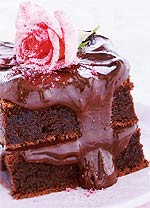You wouldn’t call your lover “salty” would you? You wouldn’t say: “Hey Sourball, you’re so salty when you buy me roses.” No, I doubt it. But you might say, “Hey Sweetness,” or, “You’re such a sugar”. You might even call him Honey-Bunny, Sweet-Lips or Cupcake. It’s kitsch, yes, but it sounds a whole lot better than Sourball. That’s because “sweet” is a sensory institution. We know what it tastes like, and we know what it implies: something pleasurable, desirable – even crave-able.
Science has now proven that humans are born with this fondness for sweet tastes. But, from the first sip of mother’s milk, the simple love for sweet things becomes progressively more complicated. “Don’t eat sweets before supper.” “Chocolate goes straight to the hips.” “What? Three sugars in your tea!”
The message? Sweet things are really bad – particularly for your waistline. The result? Guilt and sweetness go together like ice cream and chocolate sauce.
This guilt has spurred the growth of a massive non-nutritive sweetener industry. But while our supermarket shelves buckle under a range of artificial sweeteners, confusion still reigns. Which sweeteners are safe? Which are scary? It’s time to sample the array of claims and find the truth.
The claim: Sugar is fattening
The low-carb craze caused a stir over sugar. It claimed that, when it comes to fat storage, sugar is a bigger offender than dietary fat – even the sugar in fruit.
But the truth is, all sugars are carbohydrates, and any carb (from boiled sweets to bread) is broken down into simple sugars and contains about 16,8kJ per gram.
Of course, there are food products – like sugary soft drinks – that contain a whack of added sugar per serving. These products contribute energy, but no other nutrients to your daily intake, and so could contribute to weight gain if consumed in excess – especially since research published in the International Journal of Obesity in 2000 revealed that after drinking a KJ-laden soft drink, you’ll still eat a normal-sized dinner.
One too many
But weight-gain problems should only arise if you’re knocking back too much food energy on a regular basis. And if that excess energy comes from sugar-rich foods and drinks in place of nutritious whole grains, cereals, fruits, veg and low-fat dairy, you could also be compromising your total nutrient intake, and hence, your health.
“I believe that sugar and sugar-sweetened foods can be used in a balanced eating plan,” says dietician and Shape advisory board member Jane Badham.
“But I’d advise moderation: if you have three teaspoons of sugar in your tea, cut back gradually to one. If you snack on sweets every day, look at your overall lifestyle and replace the sweets with a piece of fruit.”
Dietician and sweetener expert Carol Browne concurs and says that foods and drinks containing sugar can be enjoyed as part of meals or snacks – but shouldn’t replace those mixed meals.
“Also, sugar-rich foods are often high in fat,” she says. “These foods are treats to be consumed on occasion, but they shouldn’t be staple foods.” So, in the context of a balanced diet, sugar certainly won’t wreak havoc with your weight.
The verdict: FALSE
Next week we delve into the claim that sugar is addictive
What are your thoughts on sugar? Good or bad?

